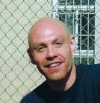We’re pleased to introduce a new contributor to our blog, Eric Burnham.
My name is Eric Shawn Burnham. I was born April 21, 1979 in Las Vegas, Nevada, but I grew up in  Oregon and California mostly. I came to prison in 2001, and I’ve been at EOCI ever since.
Oregon and California mostly. I came to prison in 2001, and I’ve been at EOCI ever since.
When I was 21-years-old, I took another man’s life while intoxicated, and I was given a 25-to-life sentence in prison. I deeply regret the actions of my youth, and I’m ashamed of the lifestyle I was living that led to the death of another human being at my hand. But as much as I want to, I cannot change the past. I can use it to shape my future, however.
In 2003 I earned my G.E.D., and in September 2015 I earned a Bachelor of Arts in Counseling, graduating Summa Cum Laude (3.98 GPA). By mid-2017 I will have earned my Master’s degree in Counseling. In addition, I’m accumulating CEUs (Continued Education Units) in order to meet the requirements for state certification as an alcohol & drug counselor. (I’ll still need 4000 hrs. of clinically-supervised counseling after I’m released.) My education is important to me because I’m dedicated to helping young people avoid making the same mistakes I made.
I work as a tutor in the G.E.D. program here at the prison, and I love my job. It doesn’t pay well, but it gives me the opportunity to help young people and practice my skills.
Personal growth, to me, means becoming the person I was designed to be. I’m not too sure where the balance is found between nature and nurture in the formation of my spirit as a unique human being. I do know, however, that I’m just one incarcerated man trying to overcome my past mistakes and make a positive impact on this crazy world. I kind of think that’s what life is all about: taking the bad and using it for good.
Finding My Purpose in Prison by Eric Burnham
Can the prison experience be good? Inmates are crammed into small cells or overcrowded dorms like sardines, surrounded by some of the most difficult personalities on the planet, and ordered around by self-righteous, often power hungry and abusive authority figures. The cramped living quarters are physically uncomfortable. The lack of privacy is emotionally exhausting, and the empty nature of prison friendships is socially unfulfilling. The boredom is mind-numbing. The loneliness can be crushing, and the inflexible power structure imbeds anger into one’s personality. The incarcerated person is completely isolated from loved ones — few things hurt more than knowing your friends and family have moved on without you. Perhaps the hardest pill to swallow, however, is knowing this is all self-inflicted. After all, if you admit it’s your own fault, you are then responsible.
There is no escaping the fact that I’m responsible for an incredible amount of devastation. I’ve brought suffering to my victim, my family, and myself; and I cannot move forward with my life until I acknowledge that. But when I finally realize I am the problem, something miraculous happens: I also realize I can do something about the problem. I find purpose. The time I’m serving in prison becomes an opportunity to change how I view the world, how I treat others, and how I meet my needs. However, I cannot accomplish that on my own. I need God’s help. But if I’m committed to learning how to become a better man, God has promised to help. “And we know that for those who love God, all things work together for good, for those who are called according to his purpose,” (Rom. 8:28).
God is interested in transforming me into an instrument of light, and He will use the difficult experiences of incarceration to bring about changes in me that I cannot completely understand. But I’ve got to do my part. I’ve got to live like I believe it. How I view my situation will determine how I live while I’m here. I am not the victim. The selfishness of my past put me here. But if the selfish deeds of my past led to my present incarceration, what might my present positive actions lead to in the future… if I give my present to Him… on purpose?





0 Comments